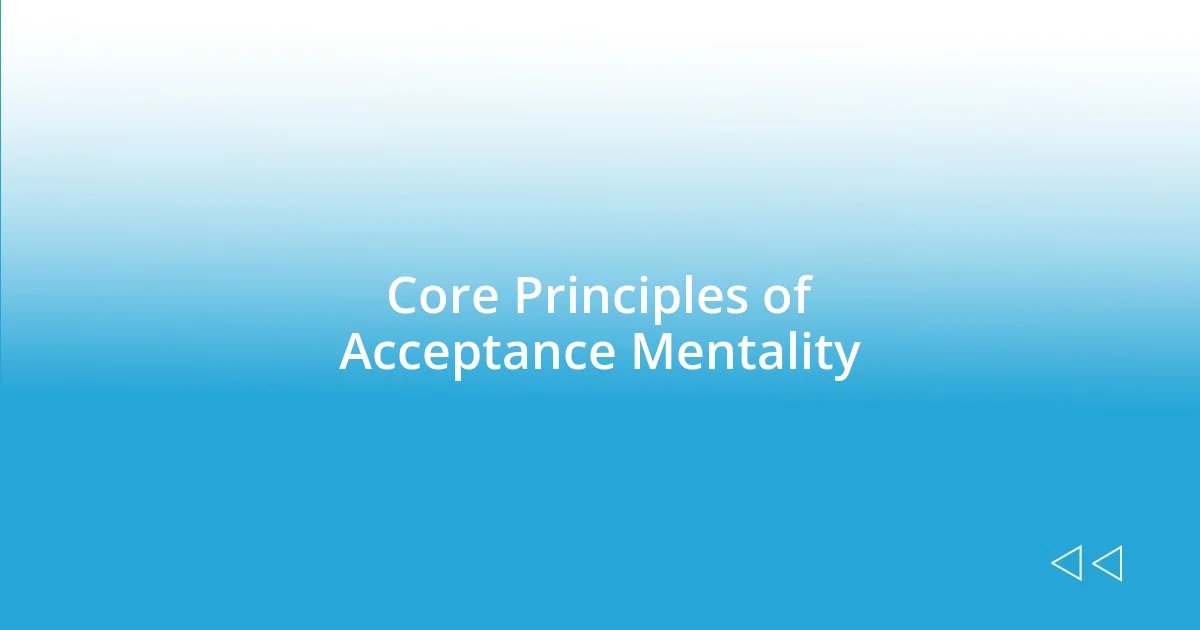Key takeaways:
- Acceptance and Commitment Therapy (ACT) emphasizes embracing thoughts and feelings, allowing individuals to live in alignment with their core values.
- Cognitive defusion techniques help separate oneself from negative thoughts, promoting emotional resilience and clarity.
- Practical applications of ACT, such as mindfulness and values clarification, enhance everyday experiences and foster a deeper sense of purpose.

Understanding Acceptance and Commitment Therapy
Acceptance and Commitment Therapy, often abbreviated as ACT, is a unique approach that encourages individuals to embrace their thoughts and feelings rather than fighting against them. I remember the moment I first encountered ACT—it felt like a breath of fresh air, lifting the weight of constant self-criticism off my shoulders. Have you ever found yourself struggling with intrusive thoughts? ACT teaches us that these thoughts don’t have to dictate our actions.
At its core, ACT revolves around six key processes: acceptance, cognitive defusion, being present, self-as-context, values, and committed action. I’ll admit, the term “cognitive defusion” initially puzzled me. But over time, I learned that it’s about separating ourselves from unhelpful thoughts, allowing us to view them as mere words rather than truths. This shift in perspective can be incredibly liberating—imagine not being held hostage by your mind!
The beauty of ACT lies in its emphasis on values and taking committed action toward those values, even in the presence of difficulties. I often ask myself, what truly matters to me? I find that this simple question guides my choices daily, reminding me to prioritize what brings fulfillment, even when challenges arise. Isn’t it empowering to know that we can act in alignment with our deepest values, regardless of our fears or discomfort?

Core Principles of Acceptance Mentality
Recognizing that acceptance is a cornerstone of mental well-being changed my understanding of emotional health. It’s about allowing our feelings to exist without pushing them away or trying to control them. I remember sitting in a quiet room, initially overwhelmed by a wave of anxiety. Instead of resisting it, I focused on acknowledging the sensation. This act of acceptance made the emotions feel less daunting, opening a pathway for me to explore deeper aspects of my mind.
Another fundamental principle of acceptance mentality is the practice of cognitive defusion, which can be transformative. I vividly recall a moment when I found myself spiraling into self-doubt before an important presentation. By distancing myself from the negative thoughts—viewing them like clouds drifting in the sky rather than truths—I was able to regain focus. This practice creates space between our thoughts and our actions, allowing us to respond rather than react automatically to our internal narrative.
The acceptance mentality also emphasizes the importance of living in the present moment. There’s something incredibly grounding about this principle. Once, during a hectic day filled with distractions, I decided to step outside and simply breathe. By immersing myself in the sights and sounds around me, I found clarity. This experience taught me that presence is not just a concept; it’s a choice we make to channel our energies into what truly matters here and now.
| Core Principle | Description |
|---|---|
| Acceptance | Embracing thoughts and feelings without judgment or resistance. |
| Cognitive Defusion | Distancing oneself from negative thoughts to view them as separate from self. |
| Present Moment Awareness | Focusing on the here and now to enhance clarity and reduce anxiety. |

Practical Techniques in ACT Practice
Certainly! Here’s a section on ‘Practical Techniques in ACT Practice’ that aligns with the tone and style you’ve established so far.
When I think about the practical techniques in ACT, a few specific practices come to mind that have been incredibly helpful in my journey. One standout for me has been the “mindfulness of breath” exercise. Focusing on my breath allows me to ground myself, especially when racing thoughts threaten to overwhelm me. By simply paying attention to my inhalations and exhalations, I create a mental buffer that reminds me I am here, not lost in my worries.
- Mindfulness of Breath: Concentrating on your breathing to anchor yourself in the present moment.
- Values Clarification: Reflecting on what truly matters to you, creating clarity and motivation.
- The Unwanted Story Exercise: Writing down negative thoughts and then visualizing them as objects that can be placed on a shelf, distancing yourself from them.
One technique that particularly resonates with me is the “values clarification” exercise. I once sat down with a notebook, and instead of writing about my typical goals, I listed what genuinely brings me joy and fulfillment. This simple act of reflection transformed my perspective—suddenly, I was more aligned with living my life purposefully rather than getting swept away by societal expectations. It was a liberating moment.
- Committed Action: Setting concrete steps toward your values, even in the face of challenges.
- Self-Compassion: Practicing kindness towards yourself during difficult moments to cultivate emotional resilience.
- Expanding Awareness: Regularly engaging in activities that foster observation of thoughts and feelings without judgment.
Through these techniques, I’ve learned to navigate life’s ups and downs with greater ease. Each approach provides a building block, reinforcing my commitment to live authentically and intentionally. It’s a journey I continue to embrace, one mindfulness moment at a time.

Applying ACT to Daily Life
When I apply Acceptance and Commitment Therapy (ACT) to my daily life, I find that small moments of mindfulness make a big difference. For example, while waiting in line, instead of tapping my foot impatiently, I take a moment to observe my surroundings. It’s amazing how this small shift allows me to detach from frustration and cultivate a sense of calm. Have you ever noticed how just a breath can center your mind?
Practicing cognitive defusion has also been crucial in managing my internal narratives. Recently, I was feeling overwhelmed by an impending deadline, and my usual spiral of “I can’t do this” kicked in. Instead of succumbing to panic, I imagined those thoughts as animated characters at a circus—entertaining, yet not a reflection of my capabilities. This playful perspective helped me regain control over my emotions, illustrating how distance from negative thoughts can empower us.
I’ve realized that committing to my values can transform mundane routines into meaningful experiences. For instance, I used to dread chores, often viewing them as a burden. However, by connecting those tasks to my value of creating a nurturing home, I shifted my mindset. Suddenly, washing dishes became less about the chore and more about the love and care I’m putting into my space. Have you tried connecting your daily tasks to what you value? You might be surprised at how it changes your experience.

Reflection on Personal Experiences
Reflecting on my personal experiences with Acceptance and Commitment Therapy (ACT) brings a sense of clarity that I hadn’t realized was possible. I remember a particularly challenging period in my life when I felt lost and uncertain. It was during that time that I was introduced to mindfulness, and I started practicing it daily. I recall sitting outside, feeling the warmth of the sun on my skin, and just observing my thoughts as if they were clouds passing in the sky. This moment of stillness taught me to notice my worries without judgment, allowing me to cultivate a deeper sense of acceptance.
An experience that stands out to me relates to values clarification; it was quite transformational. I was sitting in my living room when I jotted down the things that truly mattered to me—family, creativity, and personal growth. This simple exercise almost felt like a revelation. It made me realize how far I’d strayed from these values, lost in the chaos of everyday life. Have you ever taken a moment to reflect on what truly fuels your passion? It’s liberating to reconnect with what you love and start directing your life towards those core beliefs.
In moments of self-doubt, the practice of self-compassion has become my safety net. There were days when I felt like I was constantly falling short of my own expectations, and I remember standing in front of the mirror, feeling overwhelmed. Instead of criticizing myself as I normally would, I chose to speak kindly to myself. I said, “It’s okay to be where you are right now.” That small shift transformed my emotional landscape, turning frustration into understanding. I truly believe that embracing our imperfections can lead to a more fulfilling life. Have you tried being gentle with yourself during tough moments? It’s a game changer.















